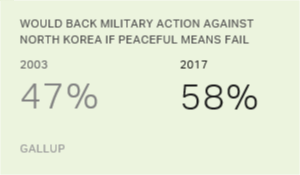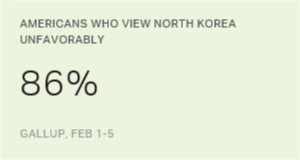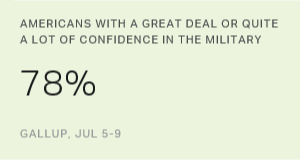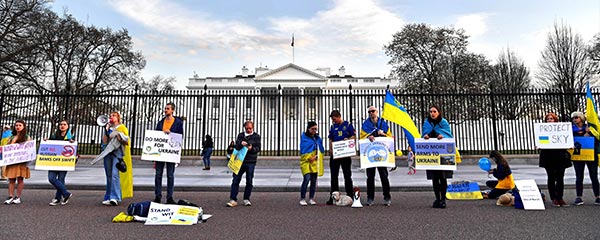Story Highlights
- Fifty-one percent of Americans say North Korea is the greatest U.S. enemy
- The percentage citing North Korea has more than tripled in two years
- Russia is second at 19% overall, including 30% of Democrats and 9% of Republicans
WASHINGTON, D.C. -- North Korea dwarfs all other countries when Gallup asks Americans whom they consider to be the United States' greatest enemy. Fifty-one percent now name the East Asian nation, more than tripling the 16% who cited it in 2016, with Russia, China and Iran distantly following.
| February 2016 | February 2018 | ||||||||||||||||||||||||||||||||||||||||||||||||||||||||||||||||||||||||||||||||||||||||||||||||||
|---|---|---|---|---|---|---|---|---|---|---|---|---|---|---|---|---|---|---|---|---|---|---|---|---|---|---|---|---|---|---|---|---|---|---|---|---|---|---|---|---|---|---|---|---|---|---|---|---|---|---|---|---|---|---|---|---|---|---|---|---|---|---|---|---|---|---|---|---|---|---|---|---|---|---|---|---|---|---|---|---|---|---|---|---|---|---|---|---|---|---|---|---|---|---|---|---|---|---|---|
| % | % | ||||||||||||||||||||||||||||||||||||||||||||||||||||||||||||||||||||||||||||||||||||||||||||||||||
| North Korea | 16 | 51 | |||||||||||||||||||||||||||||||||||||||||||||||||||||||||||||||||||||||||||||||||||||||||||||||||
| Russia | 15 | 19 | |||||||||||||||||||||||||||||||||||||||||||||||||||||||||||||||||||||||||||||||||||||||||||||||||
| China | 12 | 11 | |||||||||||||||||||||||||||||||||||||||||||||||||||||||||||||||||||||||||||||||||||||||||||||||||
| Iran | 14 | 7 | |||||||||||||||||||||||||||||||||||||||||||||||||||||||||||||||||||||||||||||||||||||||||||||||||
| GALLUP | |||||||||||||||||||||||||||||||||||||||||||||||||||||||||||||||||||||||||||||||||||||||||||||||||||
These results are based on Gallup's annual World Affairs poll, conducted Feb. 1-10, 2018 -- the eleventh time Gallup has asked the "greatest enemy" question over the past 18 years. The only other countries cited by a measurable percentage of Americans in the most recent poll were Iraq and the United States itself, each garnering 2%.
This open-ended question relies on respondents to volunteer their own answers, and historically has produced a diverse list of countries. Yet this year marks a departure from the past, with one country dominating Americans' opinions and only four garnering considerable mentions.
North Korea's rise to the top of the list of U.S. enemies is not surprising, given the escalation of tensions between the two nations since 2016, when North Korea was roughly tied with Russia, China and Iran as America's greatest foreign enemy. Although relations between the U.S. and North Korea have been tense for decades, they reached a boiling point in 2017. North Korean missile tests and threats of nuclear war ignited a war of words between Kim Jong Un and Donald Trump that has continued into 2018.
North Korea, China and Iran Have Been Mainstays on the List of U.S. Enemies
From 2001 through 2008, Iraq was first or second on the list of countries viewed as enemies of the U.S. In 2001, 38% named Iraq as the greatest U.S. enemy, which until this year was the highest proportion of responses any country had received. Notably, the question was not asked from 2002 through 2004 while the U.S. was preparing for a conflict with, and then went to war with, Iraq.
The only other time North Korea topped the list was in 2005 when it tied with Iraq. Since then, North Korea, Iran and China have consistently ranked high on the list of U.S. enemies. While Iran and North Korea are both military threats to the U.S., China has presented primarily an economic threat.
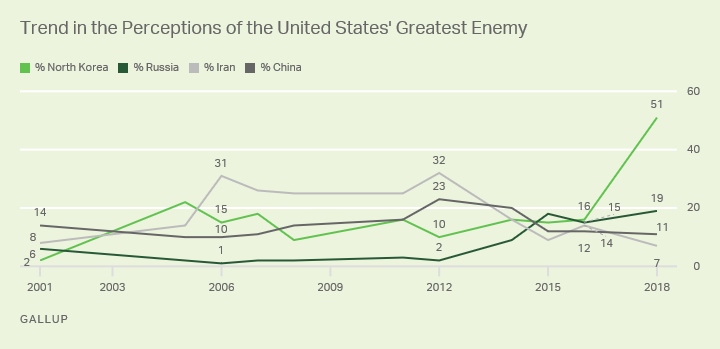
Historically, Russia has been toward the lower end of mentions on the list, yet in the past few years it has become more prominent. The Barack Obama administration had increasingly tense dealings with Russia after Vladimir Putin's election in 2012, and allegations of Russian meddling in the 2016 U.S. presidential election angered many Americans, particularly Democrats and independents.
Party Differences in Perceptions of Russia and North Korea as U.S. Enemies
Russian intervention in the 2016 election is likely a significant factor behind the 19% of Americans citing Russia as the greatest U.S. enemy -- the largest percentage for Russia in Gallup's trend. Democrats are about three times as likely as Republicans to cite Russia as the greatest enemy, and independents are about twice as likely.
| Republicans | Independents | Democrats | |||||||||||||||||||||||||||||||||||||||||||||||||||||||||||||||||||||||||||||||||||||||||||||||||
|---|---|---|---|---|---|---|---|---|---|---|---|---|---|---|---|---|---|---|---|---|---|---|---|---|---|---|---|---|---|---|---|---|---|---|---|---|---|---|---|---|---|---|---|---|---|---|---|---|---|---|---|---|---|---|---|---|---|---|---|---|---|---|---|---|---|---|---|---|---|---|---|---|---|---|---|---|---|---|---|---|---|---|---|---|---|---|---|---|---|---|---|---|---|---|---|---|---|---|---|
| % | % | % | |||||||||||||||||||||||||||||||||||||||||||||||||||||||||||||||||||||||||||||||||||||||||||||||||
| North Korea | 58 | 50 | 45 | ||||||||||||||||||||||||||||||||||||||||||||||||||||||||||||||||||||||||||||||||||||||||||||||||
| China | 15 | 11 | 7 | ||||||||||||||||||||||||||||||||||||||||||||||||||||||||||||||||||||||||||||||||||||||||||||||||
| Iran | 10 | 7 | 3 | ||||||||||||||||||||||||||||||||||||||||||||||||||||||||||||||||||||||||||||||||||||||||||||||||
| Russia | 9 | 19 | 30 | ||||||||||||||||||||||||||||||||||||||||||||||||||||||||||||||||||||||||||||||||||||||||||||||||
| GALLUP, Feb. 1-10, 2018 | |||||||||||||||||||||||||||||||||||||||||||||||||||||||||||||||||||||||||||||||||||||||||||||||||||
Republicans are more likely than Democrats to name North Korea as the greatest enemy, 58% vs. 45%, respectively. And they are also slightly more likely than Democrats to cite China or Iran.
Bottom Line
Americans' answers to open-ended questions often do not focus on a single response unless it is particularly obvious. In the case of the "greatest U.S. enemy" question, recent growing tensions with North Korea are top of mind for a slim majority of Americans.
While Russia is a distant second to North Korea, it is considered an enemy by more Democrats than Republicans, suggesting Russian meddling in the 2016 election is considered particularly dangerous to some partisan groups.
With North Korea and Russia dominating the news in recent months, Iran and China have faded into the background but remain on Americans' radar.
Survey Methods
Results for this Gallup poll are based on telephone interviews conducted Feb. 1-10, 2018, with a random sample of 1,044 adults, aged 18 and older, living in all 50 U.S. states and the District of Columbia. For results based on the total sample of national adults, the margin of sampling error is ±4 percentage points at the 95% confidence level. For results based on the samples of Republicans, independents and Democrats, the margins of sampling error are between ± 6 and ±8 percentage points at the 95% confidence level. All reported margins of sampling error include computed design effects for weighting.
Each sample of national adults includes a minimum quota of 70% cellphone respondents and 30% landline respondents, with additional minimum quotas by time zone within region. Landline and cellular telephone numbers are selected using random-digit-dial methods.
View survey methodology, complete question responses and trends.
Learn more about how the Gallup Poll Social Series works.


